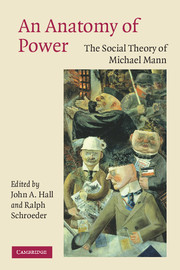Book contents
- Frontmatter
- Contents
- List of figures
- List of contributors
- 1 Introduction: the IEMP model and its critics
- Part I Theory, practice, method
- Part II Types of power
- Part III European exceptionalism?
- Part IV Promise and perils of modernity
- 13 The ‘British’ sources of social power: reflections on history, sociology, and intellectual biography
- 14 Networks and ideologies: the fusion of ‘is’ and ‘ought’ as a means to social power
- 15 Mann's dark side: linking democracy and genocide
- Part V Response
- Bibliography of Michael Mann's Writings
- Index
- References
14 - Networks and ideologies: the fusion of ‘is’ and ‘ought’ as a means to social power
Published online by Cambridge University Press: 22 September 2009
- Frontmatter
- Contents
- List of figures
- List of contributors
- 1 Introduction: the IEMP model and its critics
- Part I Theory, practice, method
- Part II Types of power
- Part III European exceptionalism?
- Part IV Promise and perils of modernity
- 13 The ‘British’ sources of social power: reflections on history, sociology, and intellectual biography
- 14 Networks and ideologies: the fusion of ‘is’ and ‘ought’ as a means to social power
- 15 Mann's dark side: linking democracy and genocide
- Part V Response
- Bibliography of Michael Mann's Writings
- Index
- References
Summary
In the contemporary era, international politics is increasingly animated by the projects of ideology-infused transnational networks. In the wake of the attack on the World Trade Center, the attempt to squelch the Al Qaeda global Islamic terrorist network was the all-absorbing foreign policy enterprise of the advanced democracies. At the same time, transnational networks, especially non-governmental activist organizations linked in what is styled a ‘global civil society’, have become a central carrier of liberalism's worldwide ideological project of promoting democracy and human rights.
The power of transnational ideological networks is hardly a new phenomenon in international affairs. The Comintern and the Christian missionaries were earlier examples. Nonetheless, some particular features of the contemporary era may be fuelling the current surge in the power of such networks, such as the creation of the Internet, the purported globalization of markets and culture, and the peaking of the United States' military-economic preponderance. Much of the research on contemporary principled networks has been done by enthusiasts who see the ideas as spreading largely because they are correct. They concern themselves with the short-run tactics of advancing the ideological agenda (Risse and Sikkink 1999). Only a few works have tried to understand this phenomenon from the standpoint of a basic theory of the sources of social power (Keck and Sikkink 1998; Boli and Thomas 1999). That is where the writings of Michael Mann may be able to help.
- Type
- Chapter
- Information
- An Anatomy of PowerThe Social Theory of Michael Mann, pp. 306 - 327Publisher: Cambridge University PressPrint publication year: 2006
References
- 2
- Cited by



